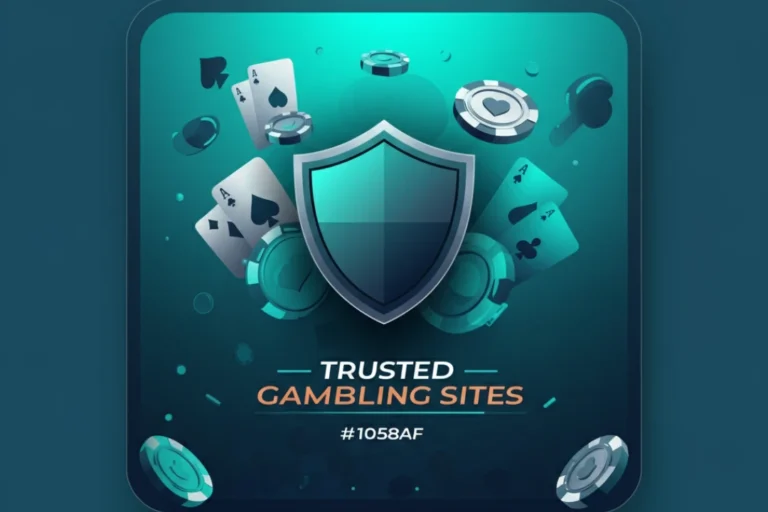With so many online casinos and betting platforms out there, it’s easy to feel uncertain about where to play. Your best bet is to focus on trusted gambling sites that actually deliver on safety, fair play, and a worry-free gaming experience. Whether you’re into slots, table games, or sports betting, this guide walks you through the simple ways to spot a legitimate operator and steer clear of risky sites. Let’s take a look at what makes a site credible—so you can enjoy your time online with confidence.
What Defines Trusted Gambling Sites?
A website’s reputation matters, but real trust comes down to how it treats your security, privacy, and rights as a player. Honest operators will always make their licensing and certifications clear, so you don’t have to dig. They are transparent about their rules and policies and are always being reviewed by independent authorities.
The Importance of Official Licensing
Every legitimate online gambling site should display a current license from a well-known authority such as the UK Gambling Commission, the Malta Gaming Authority, or the Gibraltar Regulatory Authority. These regulators keep a close eye on operators, making sure they follow strict player protection and gambling laws. If a site doesn’t show its license details, it’s a good idea to look elsewhere.
Commitment to Fair Play and Audits
Trustworthy gambling sites don’t just say their games are fair—they prove it. You’ll want to see evidence of third-party RNG (Random Number Generator) audits from organizations like eCOGRA or iTech Labs. These reports confirm that slot results and game outcomes are random and not rigged in the casino’s favor.
Core Security Features to Look For
Whenever you share personal and financial details with an online casino, security should be your top priority. Modern, trusted gambling sites invest in strong protections to keep you safe at every step.
Key security features every reliable gambling platform should include:
- SSL Encryption: Websites with HTTPS and a padlock icon use advanced SSL encryption to guard your data against hackers.
- Trusted Payment Methods: Whether you use cards, e-wallets, or bank transfers, stick with sites that only support secure, reliable payment services.
- KYC (Know Your Customer): This identity verification process helps safeguard against fraud and keeps minors off gambling platforms. While it’s an extra step, it protects you in the long run.
Evaluating Game Selection and Software Providers
A casino’s game library tells you a lot about how trustworthy it is. Quality matters—look for well-known studio names like NetEnt, Microgaming, and Evolution, since reputable software is a mark of fairness and dependability. Trusted gambling platforms are upfront about their providers and let you explore their complete list of games before you even register.
Reliable Payment and Payout Processes
A sure sign of a trusted gambling site is how it handles your money, both in and out. Nobody likes waiting forever for a withdrawal or facing surprise fees, so take a moment to review the site’s payments page.
Understanding Payout Speed
Quick access to your winnings matters. Transparent gambling sites post their expected withdrawal times and stick to them. Delays, vague withdrawal terms, or unusual document requests are all signals to be cautious.
Variety in Payment Options
Flexibility is important. The best operators support options like:
- Debit and credit cards (Visa, Mastercard)
- E-wallets such as PayPal and Skrill
- Direct bank transfers
- Popular cryptocurrencies for fast, private transactions
The Role of Customer Support
You hope you never have issues, but responsive customer support can make or break your experience if problems do crop up. Dependable gambling sites offer more than just an email address—they have fast, friendly agents available in real time.
Availability and Responsiveness
Find sites that feature 24/7 live chat, as well as clear phone numbers and emails. Try sending a test question to see how quickly they reply and how knowledgeable their staff are; it’s the best way to judge their commitment to helping customers.
Promoting Responsible Gaming
A trustworthy operator cares about your well-being, not just your bets. Responsible gambling resources—and making them easy to find—are a sign the site values players’ health over profits. These features help users set limits and remain in control.
Look for responsible gambling tools, like:
- Self-exclusion and time-out features
- Deposit and wager limits you can set yourself
- Links to help centers and professional support for problem gambling
Conclusion
Finding trusted gambling sites takes a little extra effort, but the payoff is a safer, fairer, and more enjoyable experience. Remember to check for clear licensing, strong encryption, trustworthy banking options, and a real dedication to player protection. Before you sign up, do your research—reading about online gambling safety from authoritative bodies like the UK Gambling Commission can guide your decision. Taking a moment to review credentials is worth it—and makes every gaming session that much better.—
Frequently Asked Questions
1. What is the most important factor when choosing a gambling site?
The most critical thing is to make sure the site is licensed and regulated by a reputable authority. This guarantees the site operates legally and meets high industry standards for safety and fairness.
2. How can I tell if a site’s games are fair?
Look for independent testing and certification from firms like eCOGRA or iTech Labs that audit RNGs. These badges or certificates should be easy to find on the home page or in the site footer.
3. What does SSL encryption do for me?
SSL encryption protects your sensitive data by scrambling it during online transactions. This means your personal and financial info stays safe from hackers.
4. Why do gambling sites ask for my ID?
ID verification is part of anti-fraud measures known as Know Your Customer (KYC). It helps prevent underage or illegal gambling and keeps your account secure.
5. How does responsible gaming work on trusted sites?
Top operators offer tools to help you manage play, like setting limits on deposits or taking breaks. They also provide links to organizations that support responsible gambling habits.
You may also read: Decoding Great Casino User Experiences: A Guide for Marketers


